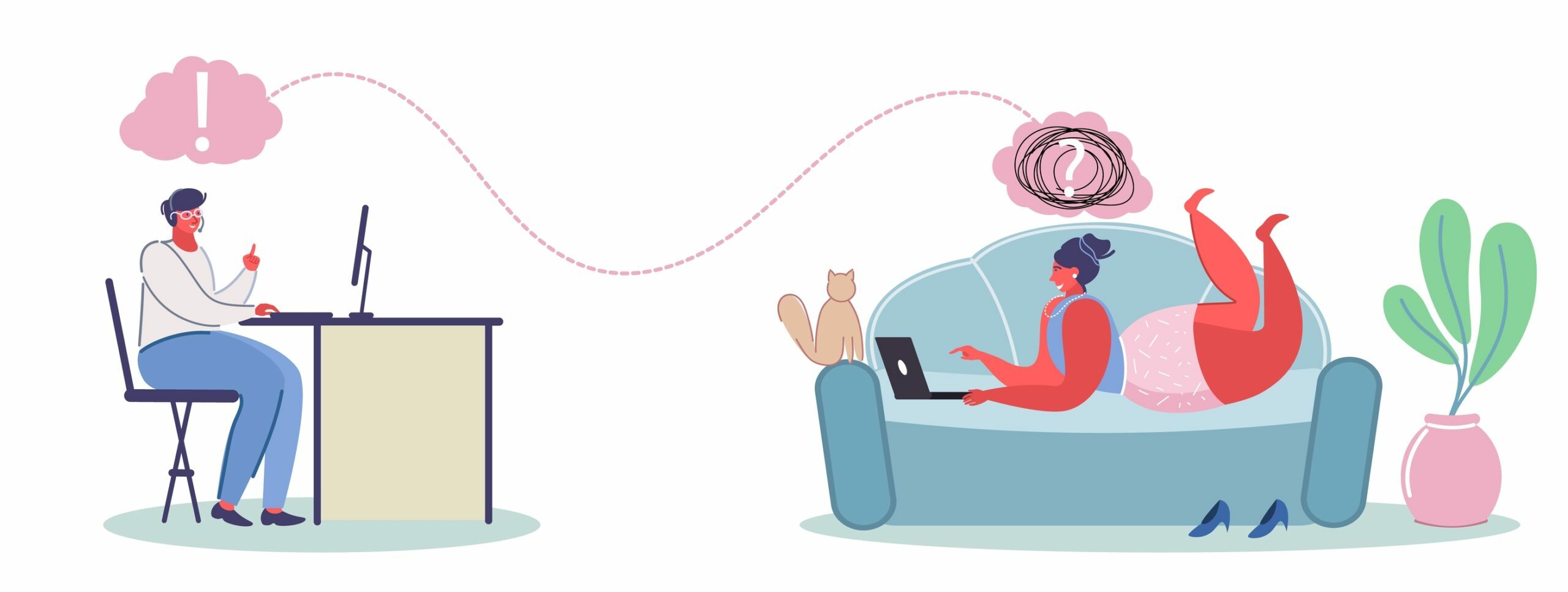One of the questions often asked in online forums is “Am I too attached to my therapist?” This question leads clients to leave therapy before they’re ready. It sometimes even leads therapists to “fire” clients early. And it leads to stigma against talking about feelings towards your therapist. This blog will explore your attachment to your therapist, including some observations from my own therapy experiences.
Understanding the Therapy Relationship
How exactly do you define the relationship between you and your therapist? It’s not a friendship. But at the same time, it’s one of the most intimate relationships you’ll have. You pay for your therapist’s attention. But your therapist also wouldn’t be doing this job if they didn’t care. Safety and vulnerability both define the uniqueness of the relationship.
While therapists have to follow certain guidelines about the relationship, each therapist interprets those rules differently. Some believe that they must share absolutely nothing of themselves. Other therapists take a more authentic approach to the relationship. These therapists share certain parts of their lives with their clients when appropriate, but are still careful to maintain that line between therapy relationship and friendship.
Growing Attached to Your Therapist
Your attachment to your therapist depends largely on your attachment style. If you struggle to trust people, it will be harder for you to trust your therapist and harder to become attached. If you trust people easily, you may become attached to your therapist easily. Regardless, it’s natural in any intimate relationship that you’d grow some sort of attachment.
The therapy relationship is not different. Instead, it is actually a reflection of other relationships in your life. Therefore, you will grow attached to your therapist in much the same way as you become attached to others in your life who are safe and trustworthy.
Curiosity About Your Therapist
It’s normal to be curious about your therapist. This is especially true when your therapist does not share about her personal life. Some people find themselves searching Google for information. Other people find themselves looking at their therapist’s social media sites. And others take a more direct approach by asking their therapist questions. Regardless which methods you use to gather more information about your therapist, accept your actions as normal behavior.
Keep in mind though that your therapist might not appreciate the digging. Therapists who have rigid boundaries around their personal life may not react kindly to you finding information about them. Stories from online forums share about therapists who “fired” clients because of these explorations.
My Curiosity About My Therapist
I have found myself wondering more and more about my own therapist’s personal life. She is not the type of therapist that keeps all information private, but I don’t know everything. I know the vague area she lives in, and I know she’s going through a divorce right now. I also know that our personal interests are very similar.
I’ve had moments where I really regret meeting my therapist as a therapist. Instead, I wish we could have met somewhere more personal so that we could have a personal relationship. She is the best therapist I’ve ever had, but I also wish that she could just be my friend.
I find myself in my sessions wondering how she’s doing. The two-sided part of a friendship pops up in my head. I can notice when she’s having an off day, and I wonder what is going on in her personal life that is distracting her. I pay her to listen to me, but I also genuinely care how she’s doing.
Why is Getting Attached to Your Therapist Scary?
Attachment to your therapist puts your emotions at risk. This is especially true if you’ve had difficult attachments in the past. You’ve learned that growing attached to people isn’t safe because eventually, they leave. And you have to deal with the emotions about it.
Sometimes, when you get attached to your therapist, your first instinct is to quit therapy. You feel like you have to protect yourself. And if you can quit before your therapist can “fire” you, you’ve accomplished that. The fear you feel about getting attached to your therapist mirrors fear you feel in other relationships.
My Fears of Attachment with My Therapist
Even though I know that attachment is normal in therapy, I still have my own fears after recognizing my attachment. First, I worry that even though she has been fairly open with me about certain things that she might balk at my attachment towards her. I worry that her concerns will result in her “firing” me. And I won’t have much control about that.
I also worry about my attachment interfering with the work that I’m doing. I have already noticed times when my attachment has led to me staying in session longer than I should. For example, just this week, I was very sick. But I was pushing to get to the full 53 minutes of our session because I wanted my therapist to be able to bill the full amount. I made it 38 minutes before I realized I needed to lay down or I was going to pass out.
And finally, I know that the relationship is going to end eventually. In fact, it’s going to end far sooner than most therapy relationships because I’m moving out of state. I know that my therapist is not going to be able to treat me after I move. So I am going to have to find someone else.
How Can Getting Attached to Your Therapist Be Healing?

While getting attached to your therapist can put you at risk of getting hurt, it can also help you heal. If you’ve struggled with attachment, you likely have very few examples of how healthy attachment looks. Your relationship with your therapist models that. In fact, even the difficult times with your therapist are beneficial, as these help you learn how to appropriately manage conflict.
Your attachment to your therapist also allows you to try out emotional intimacy. That is, you can get emotionally close to your therapist safely. You can see what it feels like to share with someone and have someone truly hold space for you.
Finally, the therapy relationship inevitably comes to an end at some point. Your therapist helps you learn how to manage the natural end to relationships. She can help you process the grief you experience at anticipating the loss, so that when it happens, you can handle it.
Final Thoughts
While attachment to your therapist comes with risks, it can also be greatly healing. You can learn how to manage conflict and the natural end of relationships. Overall, a therapist who views attachment as an essential part of therapy can really help you resolve attachment-based concerns. Ask your therapist about her view of attachment during your consultation with her.





